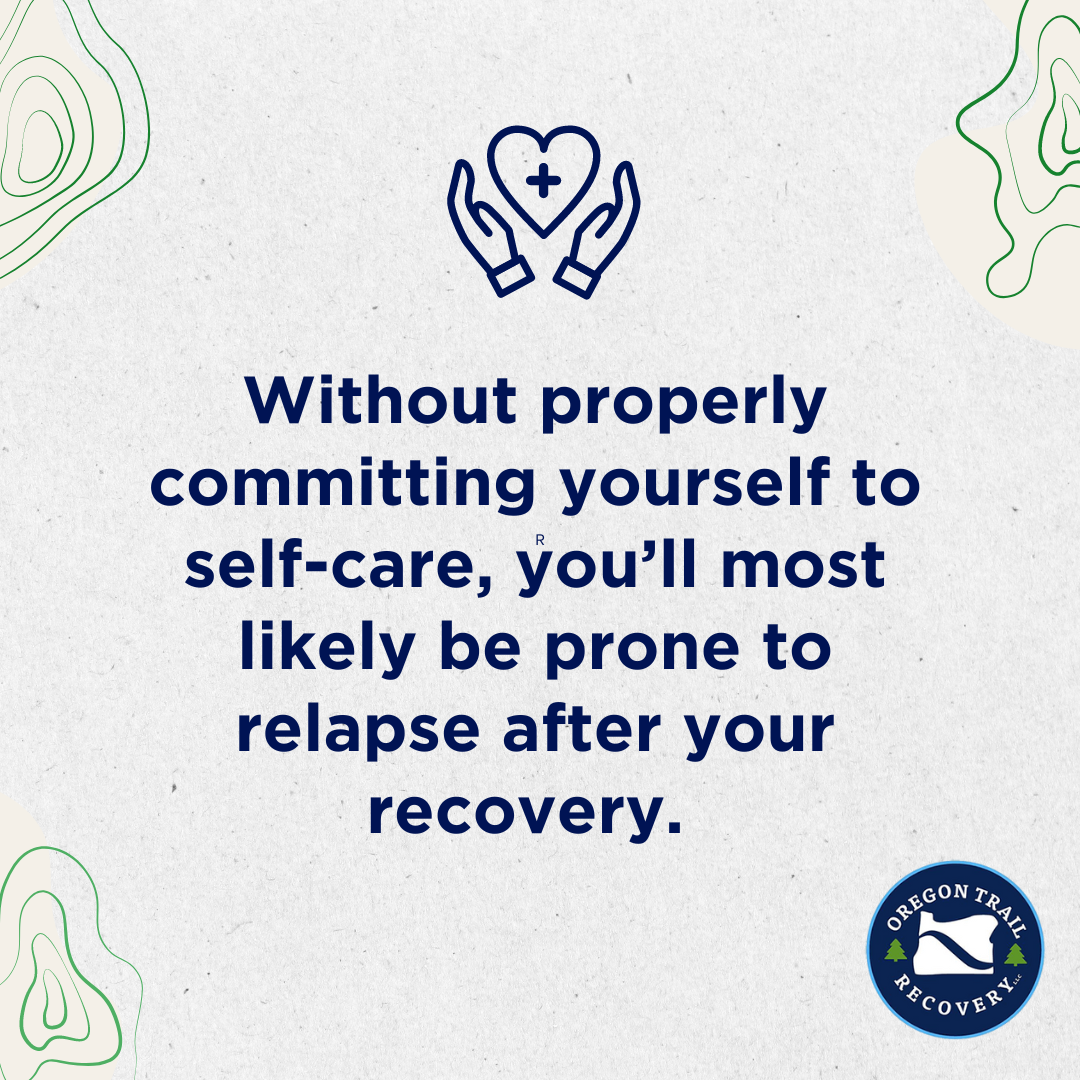
Recovering from substance use disorder does not mean solely being sober. In addition to abstinence, it also involves adopting a new way of life—one that nurtures and sustains your sobriety. One way to do it is by learning essential life skills in addiction recovery.These new life skills can help you live a fulfilling life beyond addiction. They will provide stability after recovery and further increase one’s inner strength.From practicing good self-care to financial management, here are some essential life skills you’ll learn in addiction recovery.[caption id="attachment_3850" align="aligncenter" width="1080"]

Source: Oregon Trail Recovery[/caption]
Life skills help people think critically and creatively about solving problems and making decisions. They also enable us to build great social relationships and manage a healthy, productive life.Below are some essential life skills that you can learn while in addiction recovery.
Without properly committing yourself to self-care, you’ll most likely be prone to relapse after your recovery. That said, the first step toward recovery would be practicing and valuing yourself. Self-care includes prioritizing your physical and mental being first and foremost. Things such as good hygiene, exercising, proper diet, and meditation are all part of taking care of one’s self.
Communication skills are vital life skills in addiction recovery as it allows you to reach out to your loved ones. Mastering this skill will profoundly impact your everyday life, enabling you to communicate effectively and effortlessly with the people in your immediate environment.It will become an integral part of your independent living skills, allowing you to navigate various social situations confidently and easily. By honing this ability, you can develop a strong foundation for building meaningful connections and engaging confidently with others.[caption id="" align="aligncenter" width="1125"]

Source: Pexels.com[/caption]
Social skills perfectly tie in with communication skills. However, social skills focus more on the behavioral aspect of a person. Some social skills therapy methods might include one-on-one instruction for different types of social interactions and role-playing.This can also help people dealing with social anxieties before and after recovery and further lead to new friendships or relationships, which will help your personal development. These are only a few reasons why developing social skills is crucial to addiction recovery, as it can affect how you live your life in the future.
Learning to regulate emotions properly may be the key to preventing a person from returning to their addiction. According to Dr. Amanda L. Giordano, difficulties in emotion regulation are consistent occurrences that lead to addiction.Learning self-control and alternative coping options to properly handle adverse outcomes in life, such as meditation or exercise, can help you regulate your emotions.
Emotional regulation and decision-making skills are closely intertwined. While some argue that emotions should not influence decisions, it is vital to recognize the significance of processing emotions before reaching a conclusion. By settling down and reflecting on our feelings, we can make more informed and balanced decisions.Decision-making can make a significant impact even before recovery. According to the Journal of Substance Abuse Treatment, impulsive decision-makers often lead to poorer treatment outcomes and are prone to premature treatment dropouts. This means that decision-making is also a must-learn skill during recovery.[caption id="" align="aligncenter" width="1125"]

Source: Pexels.com[/caption]
While time management may seem restrictive for those who thrive on spontaneity, it plays a pivotal role in addiction recovery. Striking a balance between structure and flexibility is crucial as you navigate your recovery journey. This balance entails creating a daily activity plan while allowing room for adjustments when unexpected challenges arise.Additionally, time management provides a sense of achievement when you accomplish everything you need to do within a specific timeframe. Time management can also help replace the time spent on the addiction with healthier activities that translate into life after recovery.
Some addictions are expensive, specifically substance abuse. Lack of money is a possible trigger for a relapse because of the negativity it invokes in a person physically and mentally. Also, a steady income is hard to obtain when going through an addiction since you’ll most likely be unfocused during work hours.Financial management can be challenging for someone recovering, but it’s not impossible. This is where “Setting Goals'' comes in. It means prioritizing needs over wants and gathering enough savings until you eventually get out of debt or have money to get that vacation you always wanted. Financial management will also lead to a fulfilling life after recovery.Here are some tips for money management tips for addiction recovery:
[caption id="attachment_3851" align="aligncenter" width="1080"]

Source: Oregon Trail Recovery[/caption]In summary, practicing good self-care, communication skills, social skills, emotional regulation, decision-making, time management, and financial management are some skills you will learn throughout recovery. It’s important to value these as they will also dictate the success of your recovery and prevent relapses.While being in recovery is a complicated process, it’s also fulfilling as you encounter a ravenous yet transformative journey to being a better person in the future. Embrace the change and growth for a fulfilling life beyond addiction.If you know anyone suffering from addiction, the Oregon Trail Recovery is here to support you. We offer various addiction recovery programs to help you achieve sobriety. Call us to schedule an appointment.